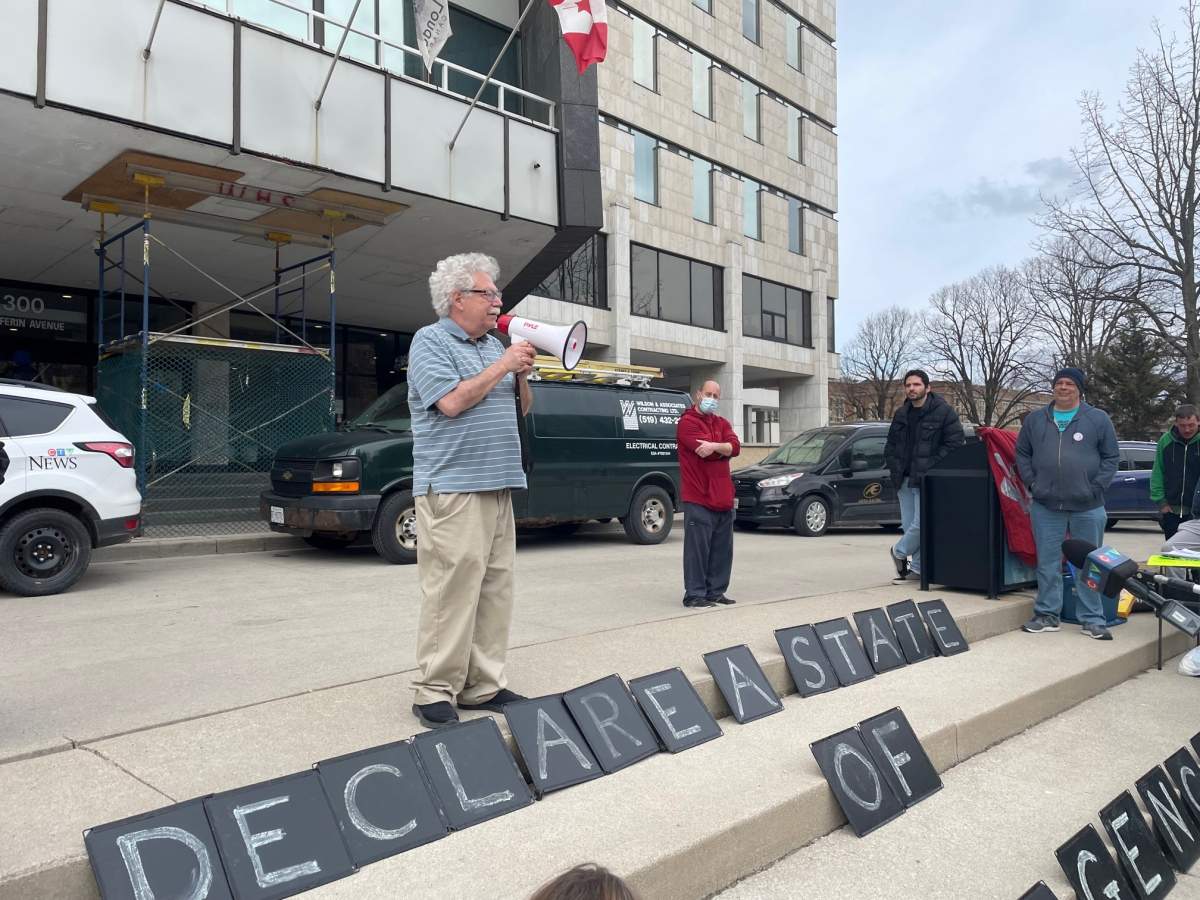London, Ont. city council officially recognized there is an “untenable emergency” in the city for housing and homelessness Tuesday afternoon.

The recognition came during a Strategic Priorities and Policy Committee (SPPC) meeting where multiple delegates asked for an official declaration of emergency for housing in London.
While all councillors that spoke during the discussion were supportive of working on the issue of housing and homelessness in the city, most were wary of having the city offer an official declaration.
Calling an official emergency declaration an “awkward tool” to address the issue, city staff informed councillors they were not aware of any advantage in accessing resources or assistance that would be gained by having an official declaration.
City staff added an official declaration is generally meant for a short-term issue that can be solved in days, weeks or months.
Ward 11 Coun. Skylar Franke put forward a motion that would “recognize” the issue as an emergency, allowing the city to further address the issue with ongoing resources without offering an official declaration.
“I do think that we can go farther and faster, and we should be doing that at every opportunity,” said Franke.
The motion, which further underscores advocating provincial and federal governments for assistance with housing and homelessness and finding other opportunities solutions, was passed unanimously by members.
A rally held outside city hall before the meeting had upwards of 40 people calling on city council to declare a state of emergency related to housing.
The rally followed an online petition started by the London Region Social Forum, which highlights soaring average rent price increases, the number of families on the waitlist for social housing, and the number of people experiencing homelessness in the city, including the 57 deaths recorded last year.

Get daily National news
“Two hundred people died on the streets of London in the last two years, largely because they don’t have housing,” said Jeff Hank, a co-organizer of the rally.
“This problem is going to continue in perpetuity unless we stand up and demand that all the housing that comes in the future, at least a third of them go to the most vulnerable with rent geared to income.”

Organizers and some attendees of the rally moved into the council chambers at 4 p.m. for the SPPC meeting, where Hanks and London Acorn representative Claire Wittnebel spoke as delegates requesting an emergency declaration.
Last month, local leaders unveiled London’s Health and Homelessness Whole of Community System Response, the city’s largely anticipated plan to combat homelessness in a “permanent and sustainable” way in the southwestern Ontario community.
The plan from London’s Health and Homelessness Summit, which was developed in around 100 days, centres around a connected set of integrated hubs that will use an “all doors lead here model,” allowing for flexible referrals, according to city staff.
In a draft estimate, the plan said that around 12 to 15 hub locations would be developed across the community, predicting an estimated five to start. Additionally, up to 30 people could be served at each location, “depending on acuity and population needs,” the plan says.
One hundred high-support housing units are also set for construction immediately, and 600 over three years, according to the plan.
However, the London Region Social Forum argues that “the city’s plan, though a great effort, is not a permanent solution and will only house about 5 per cent of the people that need it over three years.”
“Their recent attempt at solving the homeless crisis was laudable,” Hank said. “The hubs are good, but 600 social housing units over three years — we probably need 15,000.”
Non-profit organization London Cares is reporting a 68 per cent increase in homeless interactions and services within the last year.
Additionally, the forum said that there is a one per cent vacancy rate in the city with the average rent prices increasing by 36.9 per cent in the last year.
The forum said in a statement that London has “no way to meet this demand” and is asking council to “join other communities in declaring a state of emergency so the provincial and federal governments can be alerted to act urgently to mitigate this crisis.”
Six municipalities in Ontario have declared a state of emergency on the housing and homelessness crisis, including Ottawa, Niagara Falls, St. Catherines, Fort Erie, Peterborough, and Thorold.
Commenting on London’s Health and Homelessness plan, Hank said that “while well-meaning,” he thinks the city “doesn’t realize how bad the problem is.”
“Housing is one of the biggest social determinants of health (and) we’re pulling people out of the river instead of preventing them from falling in it in the first place,” Hank said.
“You judge a society based on how it treats its most vulnerable, and I think we’re failing each other.”













Comments